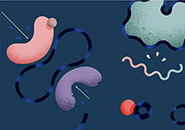
Scientific Discipline
Genetics, Medicine and Translational Research
Related Links
Host Institution
The University of Texas Southwestern Medical Center
Current Position
Dr. Hobbs is also a professor of internal medicine and molecular genetics and director of the Eugene McDermott Center for Human Growth and Development at the University of Texas Southwestern Medical Center.
Current Research
Human Genetics of Lipoprotein Metabolism
Research
Biography
A person's risk of heart disease can't be blamed solely on eating too many cheeseburgers and other foods high in saturated fat. Genetic makeup also plays a powerful role. Helen Hobbs has discovered new genes and variations within genes that account for individual differences in blood levels of low-density lipoprotein (LDL), the "bad" cholesterol. High LDL-cholesterol is a major risk factor for heart disease and heart attacks because it contributes to the buildup of plaque that can clog artery walls. By identifying the genes that influence cholesterol levels and exploring their function, Hobbs's studies have laid the groundwork for the development of new cholesterol-lowering drugs.
Hobbs was chief resident at UT Southwestern Medical Center in Dallas and well on her way to becoming a practicing endocrinologist when she decided to give research a try. Her mentor, Donald Seldin, then the school's head of medicine, was convinced that Hobbs possessed the natural curiosity and the drive to flourish in a research environment, even though she had no experience at the bench, and that she would not be fulfilled in her work without the challenge of new discovery. "He knew all my strengths, but more importantly, he knew all my weaknesses, and he felt strongly that I should do this," Hobbs recalls.
Seldin arranged for her to work as a postdoctoral fellow in the laboratory of two well-established investigators—Michael Brown and Joseph Goldstein—who later won a Nobel Prize for discovering the cell-surface receptor for LDL- cholesterol and demonstrating its role in cholesterol metabolism. Hobbs initially struggled in the laboratory. She much preferred the faster pace of clinical medicine and was easily frustrated by her own technical mistakes. "Patience is not my virtue. It took me a long time to adjust to the slow pace of laboratory science," Hobbs says. But once she started to get results, Hobbs relished the thrill of scientific discovery.
When she joined the Brown-Goldstein laboratory, the pair was trying to understand how mutations in the LDL-receptor gene affect the receptor's function. One of Hobbs's first research successes was finding a mutation in this gene that alters its ability to bind LDL- cholesterol. Today, she admits, "I am able to delight more in the slower process of telling a scientific story with my work. Ironically, the observations I have made with the greatest potential for clinical impact came from studies driven by scientific curiosity rather than thoughts of developing new therapies."
Since setting up her own laboratory at UT Southwestern in the late 1980s, Hobbs has discovered genetic defects that cause very high and very low blood levels of cholesterol and studied the faulty proteins that underlie these disorders. This information has helped determine how the body normally regulates cholesterol by removing it from the bloodstream and shuttling it to the liver, where it is broken down in the bile.
In 2001, Hobbs identified a genetic defect that causes a rare type of high-cholesterol disorder, autosomal-recessive hypercholesterolemia. People with the disease have normal-functioning LDL receptors but can't remove LDL- cholesterol from the bloodstream. She and her colleagues also discovered two genes, ABCG5 and ABCG8, that play key roles in maintaining the proper balance of sterols in the body, including plant-based sitosterol and animal-based cholesterol. Mutations in either gene can lead to a buildup of cholesterol in the blood.
In addition to her laboratory work, Hobbs runs the Dallas Heart Study, aimed at uncovering the risk factors for heart disease and at finding new treatments. Initiated in 1999, the study includes taking blood samples and performing detailed heart-imaging studies in 3,000 Dallas County residents (about half of them African American). Based on data already collected, Hobbs identified two beneficial genetic mutations linked to low levels of LDL- cholesterol. The gene alterations were found almost exclusively among African Americans. One out of 50 African Americans in the study had one of the two mutations, which increase the amount of cholesterol the liver removes from the body. The insights from these studies have contributed to the rapid development of a new class of cholesterol-lowering agents.
More recently, Hobbs has studied the pathways and processes that determine where fat accumulates in the body, whether in adipose tissue, the liver, or other tissues. She identified a new protein that directs fat to adipose tissue for storage, as well as genetic variations that contribute to fatty liver disease, a burgeoning health problem in this country.
Hobbs sees adult patients in the clinic who have genetic diseases. Sometimes their symptoms lead to the identification of a new disorder that becomes the focus of her work in the laboratory.
Articles & News
Research Papers
Selected Research Papers




